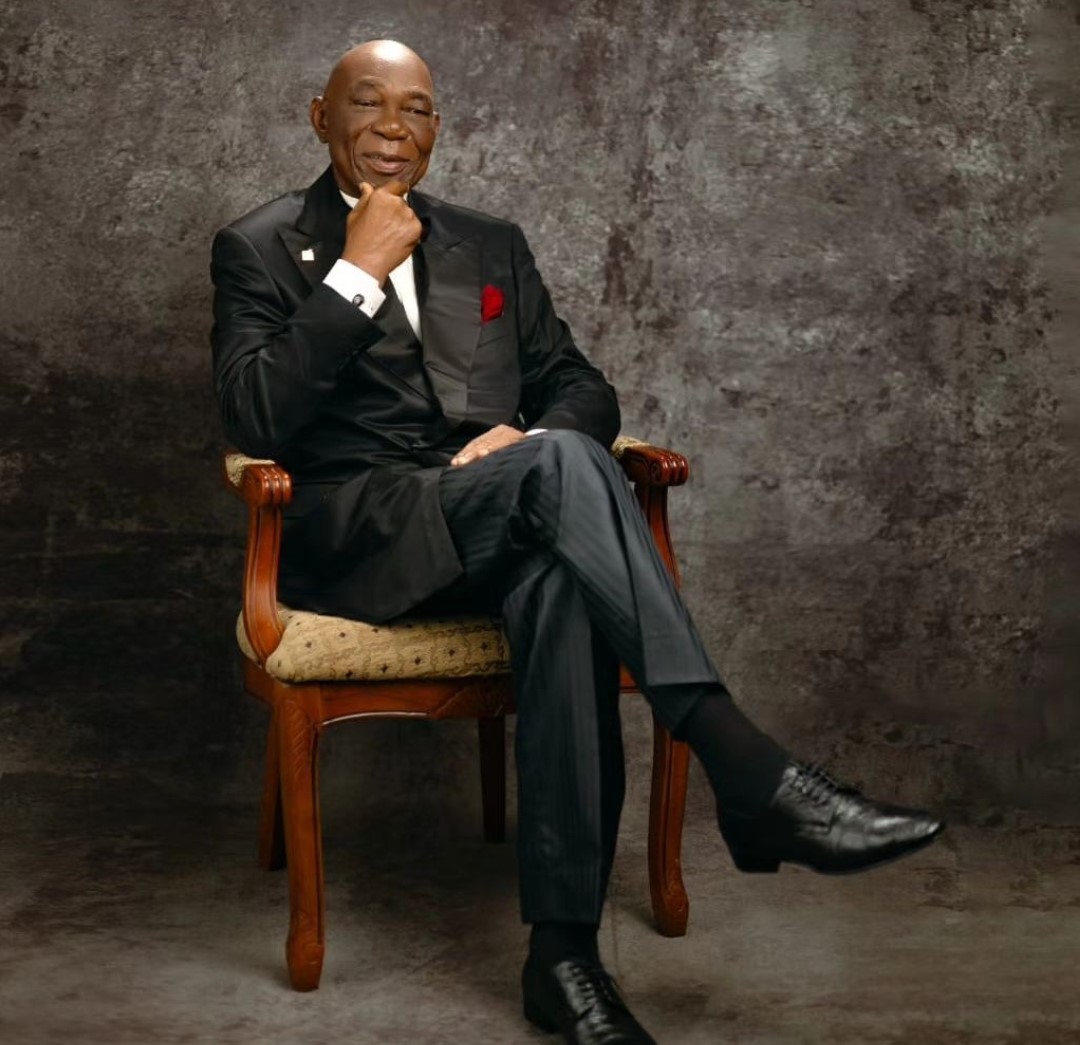The Phenomenon Called Ken Calebs-Olumese (1)
TONY OKOROJI

Two Saturdays ago, there was a very big bash in Lagos. Practically everyone who has been anyone in the Nigerian creative industry was there. Ken Calebs-Olumese, the man fondly called the Guv’nor by his many admirers, was celebrating his 80th birthday. One of the highlights of the celebration was the launching of his autobiography, “My Niteshift Coliseum Odyssey”. I am honoured to have been invited to contribute to the boundless book of 328 pages. I am publishing my 11-page contribution which can be found on pages 213 to 224, in the next three editions of Saturday Breakfast. Please read on:
If any Nigerian deserves a national honour, the Esan born workhorse and creative genius, Ken Calebs Olumese does. To the best of my knowledge, Olumese never held a government job nor did he ever do a government contract. He has however done more to create friendships across Nigeria, give impetus to many an aspiration and promote the culture of intellect, finesse and class than anyone paid from the purse of the Federal Republic of Nigeria.
The NiteShift phenomenon created by Ken Calebs Olumese deserves a whole book. Trying to capture the rise, fall and rise again of that phenomenon and the vision and sheer will power that drove it, in one chapter of a book, is a tall order.
I make bold to write that Nigeria may have been different in a number of ways without NiteShift. For instance, there is little argument that the celebrated and distinct Nigerian movie industry, which for some time has been known as Nollywood, took off with Living in Bondage, Kenneth Nnebue’s 1992 blockbuster Igbo language home video featuring the likes of Kenneth Okonkwo, Francis Agu, Okechukwu Ogunjiofor, Kanayo O. Kanayor, Nnenna Nwabueze, Ngozi Nwosu, etc. The amazingly well told ritual love story of Andy and Merit was the first time that a Nigerian audio–visual production had been successfully mass marketed in the VHS format. Undoubtedly, Living in Bondage was the hit that opened the floodgate.
However, it is indeed possible that the Nigerian movie industry would not have gained universal traction without the camaraderie that came out of 21 Opebi Road, Ikeja, the flat right above where Tastee Fried Chicken for a long time dished out ‘Charcolit Chicken’, ‘Chicken Topper Salad’ and ‘Crispy Chicken’ to all and sundry. That was where in 1988 NiteShift was born and where the likes of Zeb Ejiro, Fred Amata, Zik Zulu Okafor, Segun Arinze, Clarion Chukwurah, Gloria Anozie (before Mr. Young made her his own), Biola Ogunduyile or Abiola Segun Williams as she is now known, Richard Mofe Damijo, Liz Benson, Keppy Ekpeyong-Bassey, Kate Henshaw, Stella Damasus, Sammie Okposo and many others regularly fraternized under the banner of Glamour Boys of Nigeria (GBN). GBN was one of those unique creations of Ken Calebs Olumese. With his gift of spotting distinctive talents destined for the top before their bloom, Olumese provided this upwardly mobile crowd a platform for networking and ultimate success. Under the swinging and swaying lights of NiteShift, a lot of Nigerian movie ideas were shaped and executed and the rest, like they say, is history.
Another industry that may have been significantly touched by Olumese’s Glamour Boys of Nigeria is the media industry. In the tick of GBN were three young reporters: Femi Akintunde Johnson (FAJ), Kunle Bakare (KB) and Mayor Akinpelu. I sat through some of the conversations that spurred the trio to go ahead and bring to life the famous FAME Weekly. With their eventual separation, Kunle Bakare with FAJ created Encomium Weekly today run by KB and his wife, Desola; Mayor Akinpelu founded Global Excellence. FAJ has sat on top the Mega Awards with his wife, Iretunde. Dele Momodu, another Glamour Boy who once edited May Ellen Ezekiel’s Classique magazine, stormed the world with Ovation International before delving into politics and seeking to be President of the Federal Republic.
Ehi Braimah, once a journalist, who became almost an Olumese twin brother at NiteShift is today a communications guru and very successful hotelier. Ehi was however deputy to Moji Danisa, the famous Queen of Junk who terrorized the high and mighty with Climax magazine founded by Sunny Ojeagbase and ‘mathematical’ Segun Odegbami. Moji was succeeded at Climax by FAJ. Charles Okogene who edited Saturday Independent for many months and now runs a hyper news blog, was part of the inner sanctum of Olumese’s ‘resource team’ and so was Azuh Arinze who was Editor of Encomium Weekly but has in recent years published Yes International magazine. Arinze’s brother, Azuh Amatus, a niteshifter himself, edited the high-flying Entertainment Express founded by Mike Awoyinfa and his late friend, Dimgba Igwe. Have you forgotten Coker Onita’s Todays Choice, Muyiwa Adetiba’s Prime People and Vintage People? There is no question in my mind that the soft sell brand of journalism in Nigeria got its fillip and lubrication at NiteShift.
The doyens of Nigerian journalism such as Sam Amuka-Pemu, one of the founders of the Punch Newspapers, who later brought Vanguard Newspapers to life; Clarkson De Majomi who owned the defunct Mail Newspaper and was reputed to be one of Nigeria’s most elegant, tasteful and sought after men of a generation; Ray Ekpu, co-founder of Newswatch and Stanley Macebuh, Managing Director of the Guardian, found the NiteShift Gold Card Sector (later, Platinum Sector) to be a great place to unwind, sip vintage cognac, make friends and have exhilarating conversations. So did the very cerebral Bolaji Akinyemi, Sunny Kuku, Festus Odimegwu, Kalu Idika Kalu, Bode Olajumoke, etc, etc. At Niteshift, they talked politics across tribal lines; they talked business without tribal borders and made things happen in Nigeria.
NiteShift was also a magnet for Nigeria’s beautiful women of power: from the likes of Opral Benson to Florence Ita Giwa to Franca Afegbua to Jennifer Madike and whoever was qualified to be among the nation’s most high-flying fashionistas. They loved the special royal treatment Olumese gave them and the razz and pizzas that NiteShift exuded. What of the designers who clothed them? Where else do you think you would have found David Kolawole Vaughan, my man, Dakova; Maureen Amenechi of Maufechi; Godwin Mekwuye of Vivid Imagination or city clothier, Bevista? They all laid siege at the NiteShift.
It is true that like many others, I religiously read Rueben Abati in the Guardian. It is also true that without NiteShift the real brilliance of Abati, the man who went on to become Chief Press Secretary to President Goodluck Jonathan, Deputy Governorship candidate in Ogun State and an important voice on Arise TV, may not have become apparent. At NiteShift, Dr. Abati was a constant member of Olumese’s resource team and the very articulate reviewer with the uncanny retentive memory of many a Grand House Reception proceeding. Abati simply held many spellbound. The Grand House Reception was the NiteShift flagship event, an intellectual feast, where a key policy maker or newsmaker is brought to the hot seat on the revolving stage and fired questions from every direction on important national or international issues with the nation’s hottest journalists in the mix.
In the long list of persons who have had to face a barrage of questions at the Niteshift Grand House Reception will be found the late MKO Abiola, Atiku Abubakar, Goodlucjk Jonathan, Babatunde Fashola, Orji Uzor Kalu, Ayo Fayose, Jolly Nyame, Emmanuel Uduaghan, Anyim Pius Anyim, Ikedi Ohakim, T.A. Orji, Nasir el Rufai, etc. The effervescent Ghanaian Head of State, JJ Rawlings was not spared live fire from all and sundry as he went on the hot seat at the NiteShift Grand House Reception.
At Niteshift, every step was choreographed, rehearsed and rehearsed again and no detail was spared. Olumese was a great believer in the maxim, “If you fail to plan, you have planned to fail”. He planned for everything. Victor Eiremokhae, the smiling police officer turned lawyer, made sure that security was always top notch. No poorly dressed person was allowed into NiteShift regardless of how many bags of money he was bringing with him. Every sector had its special wine glass. A hostess could be sacked for sitting a guest in the wrong sector of the club or serving the guest with the wrong glass. At a Grand House Reception, the dressing of the crew was ‘oriental ornamental’.
See you next week.















